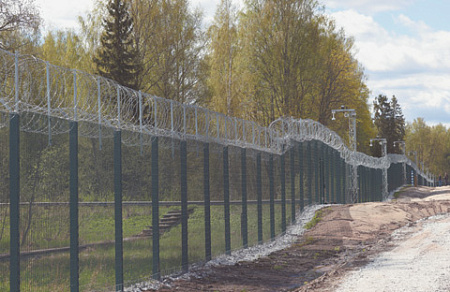
The Administrative Committee of the Finnish Parliament has supported the government’s proposal to extend the Border Security Act, or the so-called Expulsion Act, until the end of 2026. This means that the Cabinet’s decision to close the border with Russia will be in effect for at least another year and a half.
According to the Law on Expulsion, the government is given the right not to accept applications for international protection and asylum at all if Russia “sends migrants from third countries to the eastern border of Finland” in order to put pressure on Helsinki. The committee noted that the security situation on the border with Russia, which was closed back in November 2023, is “serious and difficult to predict.”
“A rapid development of events for the better is not expected, even if active hostilities in Ukraine cease,” the website of the Finnish parliament says.
The chairman of the administrative committee, Mauri Peltokangas, told reporters that no changes had been made to the original version of the law, adopted on July 22, 2024. Only the total term of its validity is changing – two and a half years, that is, until the end of 2026.
According to Interior Minister Marie Rantanen, the law, adopted as an exception, is necessary because the threat of “directed” migration from Russia remains high. At first, Helsinki demanded certain “guarantees” from Moscow regarding migrants from Africa and the Middle East. At the beginning of 2025, Prime Minister Petteri Orpo indicated that it was not possible to open the border with Russia even on an experimental basis.
The country’s Border Guard Service stands in solidarity with the Interior Ministry. According to Antti Wirth, Deputy commander of the Border Guard Service of Southeastern Finland, the Expulsion Law is a necessary tool if mass attempts by refugees to enter the country from Russia are recorded, as two years ago.
“This is, in fact, the only way to prepare and manage the situation if asylum seekers become active on the eastern border. From the point of view of our powers, it would be very good if the law remained in force,” he explained.
Contrary to the opinion of the authorities, the law restricting traffic across the eastern border has been repeatedly criticized in Finland for non-compliance with European legislation. Thus, Justice Chancellor Tuomas Pejusty is convinced that the government’s arguments for extending the validity of the law are insufficient.
The Administrative Committee of the Parliament was no exception. Its members from the opposition parties “Greens” and “Union of Left Forces” (SLS) opposed the extension. According to SLS MP Anna Kontula, there is no doubt that the law contradicts international law, EU legislation and the Finnish Constitution. “It is wrong to refuse to help people in distress just because some foreign state uses them for its foreign policy purposes, especially if under international law we are obliged to provide such assistance,” the media quoted the parliamentarian as saying.
Fearing an influx of illegal immigrants, Finland is not only not going to open the border, but is also building a fence at an accelerated pace to reliably isolate itself from Russia. Last week, the construction of the first 35 km of barriers was completed. The fence consists of 3.5 m high metal sections topped with meter-long barbed wire, and is equipped with cameras, sensors, loudspeakers, and light signals.
“The border barrier is absolutely necessary to ensure border security,” Samuel Siljanen, head of operations at the Finnish Border Service, told Reuters. He believes that the presence of barriers facilitates border control and the ability to act in the event of a border violation or any border incident.
It was assumed that the construction of the fence would be completed by the end of 2026, but now its construction is ahead of schedule.
Against the background of the closure of the border with Russia, the territory on the Finnish side has actually fallen into disrepair, the Finnish media state. Hotels, supermarkets, travel agencies, customs, sanitary and veterinary points are idle. The entire once-thriving infrastructure is now suffering huge losses. At the same time, the monthly cost of maintaining eight closed checkpoints costs Helsinki 500 thousand euros.
